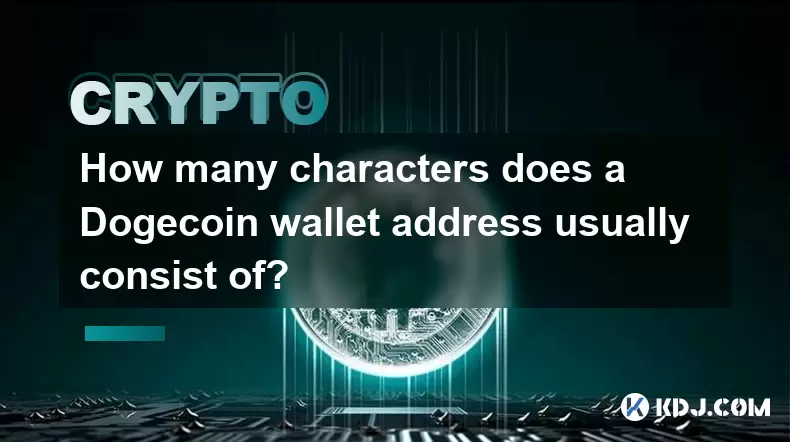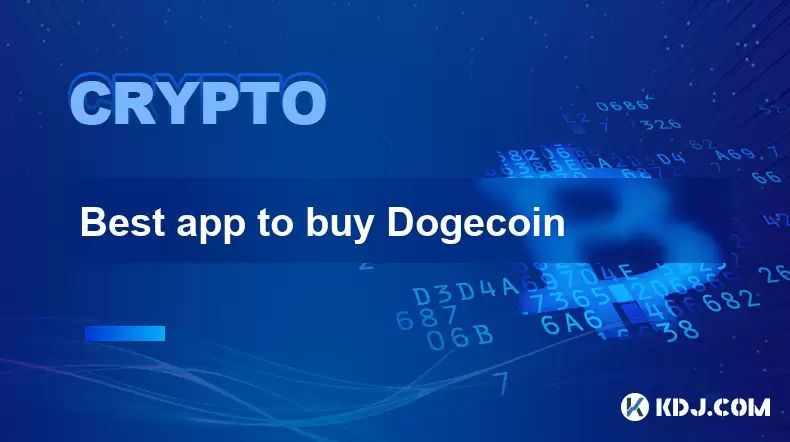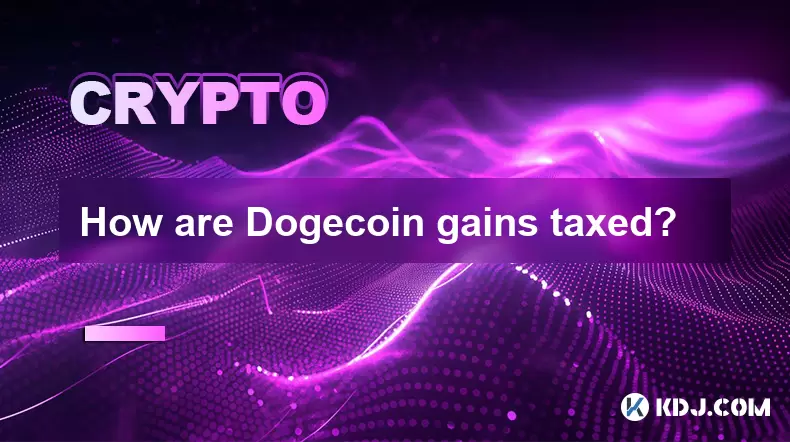-
 bitcoin
bitcoin $87959.907984 USD
1.34% -
 ethereum
ethereum $2920.497338 USD
3.04% -
 tether
tether $0.999775 USD
0.00% -
 xrp
xrp $2.237324 USD
8.12% -
 bnb
bnb $860.243768 USD
0.90% -
 solana
solana $138.089498 USD
5.43% -
 usd-coin
usd-coin $0.999807 USD
0.01% -
 tron
tron $0.272801 USD
-1.53% -
 dogecoin
dogecoin $0.150904 USD
2.96% -
 cardano
cardano $0.421635 USD
1.97% -
 hyperliquid
hyperliquid $32.152445 USD
2.23% -
 bitcoin-cash
bitcoin-cash $533.301069 USD
-1.94% -
 chainlink
chainlink $12.953417 USD
2.68% -
 unus-sed-leo
unus-sed-leo $9.535951 USD
0.73% -
 zcash
zcash $521.483386 USD
-2.87%
How many characters does a Bitcoincoin wallet address usually consist of?
A Dogecoin wallet address starts with "D," uses Base58Check encoding, and typically contains 26 to 35 characters for secure transactions.
Jun 19, 2025 at 01:35 am

Understanding the Structure of a Dogecoin Wallet Address
A Dogecoin wallet address is a unique identifier used to receive and send Dogecoin transactions across the blockchain network. It typically appears as a string of alphanumeric characters, combining both uppercase and lowercase letters along with numbers. The structure of these addresses follows specific encoding rules that ensure consistency and security within the Dogecoin ecosystem.
One of the primary features of a Dogecoin wallet address is that it starts with the letter 'D'. This distinguishes it from other cryptocurrency addresses like Bitcoin or Litecoin. The rest of the characters are generated using a process known as Base58Check encoding, which helps prevent common typing errors by excluding similar-looking characters such as 0 (zero), O (capital o), I (capital i), and l (lowercase L).
Standard Length of a Dogecoin Address
The typical length of a Dogecoin wallet address ranges between 26 and 35 characters. While this may seem variable, the actual number depends on how the public key is compressed during the generation process. Most modern wallets use compressed public keys, which usually result in addresses that are around 34 characters long.
It’s important to note that while some older wallets or legacy systems might generate shorter addresses, the standard today is 34 characters. These variations arise due to differences in how public keys are encoded before being transformed into a readable wallet address.
How Are Dogecoin Addresses Generated?
Creating a Dogecoin wallet address involves several cryptographic steps. Here's a detailed breakdown:
- A private key is randomly generated using secure cryptographic algorithms.
- From this private key, a corresponding public key is derived using elliptic curve multiplication.
- The public key is then hashed using SHA-256 followed by RIPEMD-160 to produce a shorter, fixed-length hash.
- A version byte is prepended to this hash—for Dogecoin, this version byte is '1E' in hexadecimal.
- The result undergoes a double SHA-256 hash to create a checksum.
- Finally, the entire string is encoded using Base58Check, producing the final wallet address.
Each step ensures that the resulting address is not only unique but also resistant to common data corruption and input errors.
Checking the Validity of a Dogecoin Address
Because Dogecoin addresses are sensitive to even minor typos, it's crucial to verify their validity before sending funds. Tools such as blockchain explorers and wallet validation functions can help confirm whether an address is legitimate.
Here’s how you can validate a Dogecoin address manually or through software:
- Ensure it starts with a capital 'D'.
- Confirm that it does not contain ambiguous characters like '0', 'O', 'I', or 'l'.
- Use a checksum verification tool or API that decodes the Base58Check format and validates the embedded checksum.
Many wallets automatically perform these checks when users attempt to send DOGE, providing warnings if the address seems invalid or malformed.
Differences Between Legacy and SegWit Addresses in Dogecoin
While Segregated Witness (SegWit) has been widely adopted in Bitcoin and Litecoin, Dogecoin currently does not support SegWit addresses. As a result, all Dogecoin addresses remain in the traditional Pay-to-Public-Key-Hash (P2PKH) or Pay-to-Script-Hash (P2SH) formats.
This means that regardless of the wallet service you're using, your Dogecoin address will always follow the same structural rules. You won’t encounter newer address types like bech32 (which start with 'bc1') as seen in Bitcoin. Therefore, every Dogecoin wallet address remains within the 26–35 character range and adheres to the Base58Check encoding standard.
Receiving and Sending DOGE Using Wallet Addresses
To successfully interact with the Dogecoin network, users must correctly handle wallet addresses during transactions. Here's how to do it securely:
- When receiving DOGE, always copy the wallet address directly from your wallet application. Avoid retyping it manually to prevent errors.
- Before sending DOGE, paste the recipient's address into a validation tool or use your wallet’s built-in verification feature.
- Double-check the address length and starting character (must begin with 'D') to ensure it's valid.
- Never reuse the same address multiple times for receiving payments unless necessary, as this reduces privacy and traceability benefits offered by blockchain technology.
Following these practices minimizes the risk of irreversible fund loss due to incorrect or maliciously altered addresses.
Frequently Asked Questions
Q: Can a Dogecoin wallet address be shorter than 26 characters?No, a valid Dogecoin wallet address cannot be shorter than 26 characters. Any address falling below this length is either malformed or not a genuine Dogecoin address.
Q: Is it safe to reuse the same Dogecoin wallet address multiple times?While technically possible, reusing the same address is discouraged due to privacy concerns. Each transaction becomes publicly visible on the blockchain, making it easier to track your activity if you reuse addresses.
Q: What happens if I send DOGE to an invalid wallet address?If the address is invalid or mistyped, most modern wallets will detect the error and block the transaction before it’s broadcasted. However, if the transaction is sent despite the warning, the funds may be lost permanently.
Q: Do Dogecoin wallet addresses change over time?Yes, many wallets generate new addresses for each incoming transaction to enhance privacy and security. Some wallets allow users to view and manage previously used addresses as well.
Disclaimer:info@kdj.com
The information provided is not trading advice. kdj.com does not assume any responsibility for any investments made based on the information provided in this article. Cryptocurrencies are highly volatile and it is highly recommended that you invest with caution after thorough research!
If you believe that the content used on this website infringes your copyright, please contact us immediately (info@kdj.com) and we will delete it promptly.
- Work Dogs Unleashes TGE Launch, Sets Sights on Mid-2026 Listing & Ambitious $25 Token Target
- 2026-01-31 15:50:02
- WD Coin's TGE Launch Ignites Excitement: A Billion Tokens Set to Hit the Market
- 2026-01-31 16:10:02
- Royal Mint Launches Interactive £5 Coin for a Thrilling Code-Breaker Challenge
- 2026-01-31 16:10:02
- Crypto, AI, and Gains: Navigating the Next Wave of Digital Assets
- 2026-01-31 15:50:02
- Coin Nerds Forges Trust in the Digital Asset Trading Platform Landscape Amidst Evolving Market
- 2026-01-31 16:05:01
- Blockchains, Crypto Tokens, Launching: Enterprise Solutions & Real Utility Steal the Spotlight
- 2026-01-31 12:30:02
Related knowledge

Bitcoincoin burning mechanism
Jul 20,2025 at 09:21pm
What is the Dogecoin burning mechanism?The Dogecoin burning mechanism refers to the process of permanently removing DOGE tokens from circulation by se...

How to earn free Bitcoincoin?
Jul 19,2025 at 10:08pm
What is Dogecoin and Why Earn It?Dogecoin (DOGE) started as a meme-based cryptocurrency in 2013 but has grown into a widely recognized digital asset. ...

Is Coinbase a good wallet for Bitcoincoin?
Jul 19,2025 at 04:42pm
Understanding Coinbase as a Wallet Option for DogecoinWhen considering where to store Dogecoin, Coinbase is often mentioned as a potential option due ...

How to buy Bitcoincoin with PayPal?
Jul 23,2025 at 06:57am
Understanding the Basics of Buying DogecoinBefore diving into the process of buying Dogecoin with PayPal, it’s essential to understand what Dogecoin i...

Best app to buy Dogecoin
Jul 23,2025 at 03:08pm
What Is a Cryptocurrency Exchange and How Does It Work?A cryptocurrency exchange is a digital marketplace where users can buy, sell, or trade cryptocu...

How are Dogecoin gains taxed?
Jul 25,2025 at 07:01am
Understanding the Taxation of Dogecoin GainsWhen it comes to Dogecoin (DOGE), many investors are drawn to its meme-inspired branding and volatile pric...

Bitcoincoin burning mechanism
Jul 20,2025 at 09:21pm
What is the Dogecoin burning mechanism?The Dogecoin burning mechanism refers to the process of permanently removing DOGE tokens from circulation by se...

How to earn free Bitcoincoin?
Jul 19,2025 at 10:08pm
What is Dogecoin and Why Earn It?Dogecoin (DOGE) started as a meme-based cryptocurrency in 2013 but has grown into a widely recognized digital asset. ...

Is Coinbase a good wallet for Bitcoincoin?
Jul 19,2025 at 04:42pm
Understanding Coinbase as a Wallet Option for DogecoinWhen considering where to store Dogecoin, Coinbase is often mentioned as a potential option due ...

How to buy Bitcoincoin with PayPal?
Jul 23,2025 at 06:57am
Understanding the Basics of Buying DogecoinBefore diving into the process of buying Dogecoin with PayPal, it’s essential to understand what Dogecoin i...

Best app to buy Dogecoin
Jul 23,2025 at 03:08pm
What Is a Cryptocurrency Exchange and How Does It Work?A cryptocurrency exchange is a digital marketplace where users can buy, sell, or trade cryptocu...

How are Dogecoin gains taxed?
Jul 25,2025 at 07:01am
Understanding the Taxation of Dogecoin GainsWhen it comes to Dogecoin (DOGE), many investors are drawn to its meme-inspired branding and volatile pric...
See all articles





















![Ultra Paracosm by IlIRuLaSIlI [3 coin] | Easy demon | Geometry dash Ultra Paracosm by IlIRuLaSIlI [3 coin] | Easy demon | Geometry dash](/uploads/2026/01/31/cryptocurrencies-news/videos/origin_697d592372464_image_500_375.webp)




















































